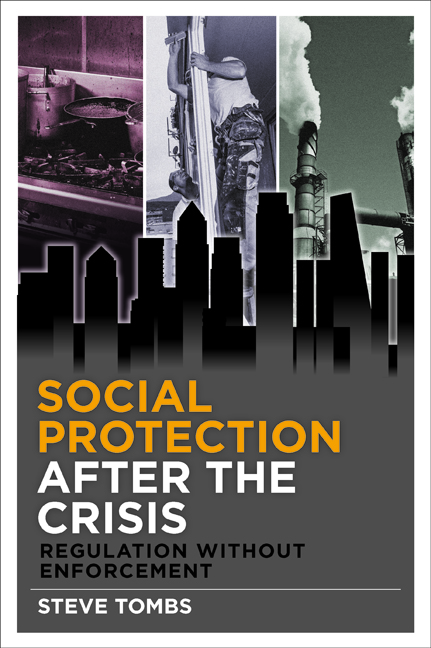Book contents
- Frontmatter
- Contents
- List of tables and figures
- About the author
- Acknowledgements
- one Introduction: some starting points
- two The new material and moral saliences of private capital
- three Framing the crisis: moral critique and the renewal of ‘business as usual’
- four Regulation, orthodoxy and hegemony: crisis, what crisis?
- five Re-regulation in action: ‘Better Regulation’
- six Regulatory inaction? Regulation without enforcement
- seven After regulation?
- Notes
- References
- Index
seven - After regulation?
Published online by Cambridge University Press: 01 September 2022
- Frontmatter
- Contents
- List of tables and figures
- About the author
- Acknowledgements
- one Introduction: some starting points
- two The new material and moral saliences of private capital
- three Framing the crisis: moral critique and the renewal of ‘business as usual’
- four Regulation, orthodoxy and hegemony: crisis, what crisis?
- five Re-regulation in action: ‘Better Regulation’
- six Regulatory inaction? Regulation without enforcement
- seven After regulation?
- Notes
- References
- Index
Summary
It was never a question of regulation or no regulation, of state control or laissez-faire; there were, rather, the questions of what kind of regulation and by whom…The stability and future of the economy is grounded, in the last analysis, on the power of the state to act to preserve it. Such support does not end crises, nor does it eliminate antagonisms in the very nature of the economy, but it does assure the ability of the existing social order to overcome, or survive, the consequences of its own deficiencies. (Kolko, 1963, 4, 302)
Introduction
Gabriel Kolko's magisterial political history of the Progressive Era in the US re-interprets this as an ‘era of conservatism’. This period, at the turn of the nineteenth century, up to approximately 1920, is widely referred to as an age of social reform most notably marked by significant and unprecedented state interventions in the economy, and thus departures from laissez-faire orthodoxy, via varieties of regulation. The key mis-interpretation of what this wave of regulation represented for US capital and capitalist development is based in misunderstandings of regulation per se – that it automatically benefits the general welfare, is antithetical to the interests of capitals, capitalists and capitalism, reflects the state as some neutral arbiter among competing interests, mistakes government intervention as representing the furtherance of popular, democratic control over elite interests and, equates regulation with government activity, and ‘deregulation’ as the withdrawal of such.
Thus, for Kolko, the years spanning the Presidencies of Roosevelt, Taft and Wilson are best understood via what he calls ‘political capitalism’ – the utilisation of political mechanisms to secure the dominance of economic interests. Its basis was a political consensus among business and political leaders about the social good, and a shared set of social values, ‘ultimately, class values’ (Kolko, 1963, 284), allowed the development of a ‘functional unity of major political and business leaders’ (Kolko, 1963). Its key vehicle was regulation.
Kolko's thesis is introduced not because it is wholly unproblematic, nor because his objects of analysis equate precisely with those of this book – far from it. But where he was prescient was in setting out a view of regulation which problematises this as inevitably antithetical to capital, and indeed for specific businesses.
- Type
- Chapter
- Information
- Social Protection after the CrisisRegulation without Enforcement, pp. 181 - 214Publisher: Bristol University PressPrint publication year: 2015



